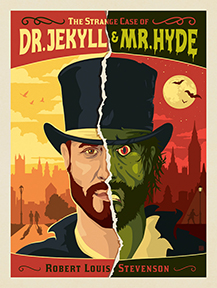
This semester, I’ve been taking multiple classes that focus on classic stories, from American, to British, to even World literature. About a month ago, my British literature professor, Dr. Roxie James, had me read a short story by Robert Louis Stevenson called “Strange Case of Dr. Jekyll and Mr. Hyde”. This is arguably one of Stevenson’s most famous works, being responsible for hundreds of adaptations. However, a lot of these said adaptations never seem to fully commit to the source material.
When I say that, I mean they all have the character of Henry Jekyll completely backwards. Hyde was never some split personality that would make him black out. On the contrary, Jekyll was perfectly conscious when he switched to his younger, more prudent form. The whole point of him becoming Hyde was to indulge in the dark desires he’s hidden all his life. The whole point of the story was that Jekyll was fully aware of every wrongdoing he did as Hyde, he just didn’t care. If anything, Hyde was more like a drug or alcoholic beverage that Jekyll had become addicted to.
While the short story offers a good look into the human condition, it is not without its flaws. The main character, Mr. Utterson, is a poor excuse for a protagonist. Just to give you an example of how uninteresting he is, Stevenson starts the book by describing to us just how dull and boring he is. Mr. Utterson’s favorite hobby is walking with his cousin while they talk about nothing, which kind of reminds me of how I act with my friends, which only makes me despise this man more.
Another problem with this story is dialogue repetition. The characters in this story will take five minutes to say something that could easily be said in ten seconds.
Let’s say you were to ask Mr. Utterson or Mr. Poole if they wanted crackers with their chilli, they would nearly give you a Shakespearean-esque paragraph about how they would like some.
I know someone reading this is gonna say something like “Well what do you expect Kevin? This is Victorian literature after all.” And to that, I’d reply: “Yes, and….? “Pride and Prejudice” came out seventy-three years before this story and Elizabeth Bennet doesn’t spend half a page talking about how she wished it was colder outside.”
And so we come to the end of my rant. Now, I have something to ask you, fellow readers: How do you like my previous works? I’ve gotten back into doing interviews like I did when I first started working for the newspaper. Now, the professors I’ve interviewed have been nothing less than a joy to talk to, but I just can’t find the passion for it the same way I have for these little book rants I like to do.
What do you all think? Should I continue these interviews or would you like me to go back to the normal stuff? I appreciate all feedback, positive or negative.
